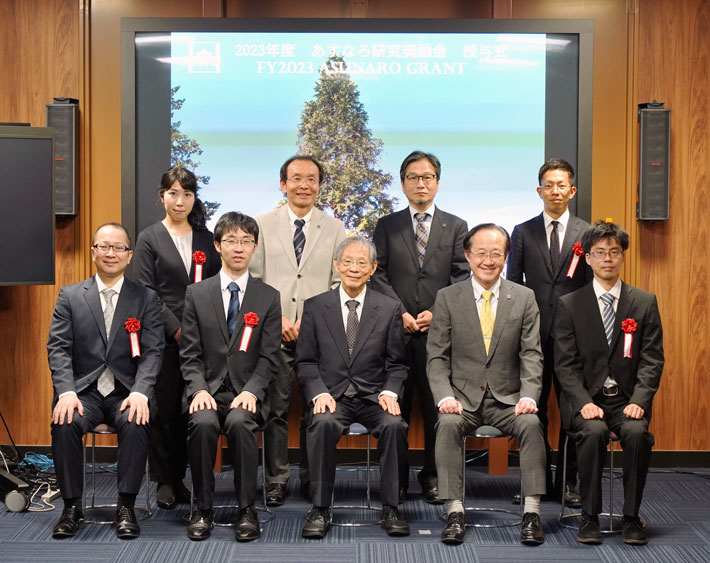Five researchers received the 2023 ASUNARO Grant, which is Tokyo Tech financial support for researchers under 45 years of age engaged in basic research. A ceremony to present the researchers with their award notices was held on June 23.

Memorial photo of the ceremony
Front from left: Assis. Prof. Ienaga, Assis. Prof. Hirata, Prof. Emeritus Asano, President Masu, Assis. Prof. Yamaguchi
Back from left: Assis. Prof. Nagashima, Executive Vice President for Research Watanabe, Head of Research Development division Nitta, Assis. Prof. Morita
The grant was established in FY 2020, in response to Professor Emeritus Koichi Asano's wish to donate a portion of the proceeds from his research, saying, "I am grateful to society for the many years of support that allowed my work in basic research to flourish. In return, I would like to use the funds to support basic research by future generations."
This is the third time the Institute has provided the grant for which 12 researchers applied and 5 were selected as recipients. At the ceremony to present the recipients with their award notices, President Kazuya Masu stated in a speech that he was looking forward to seeing the development of their research.
FY2023 Recipients of ASUNARO Grant
Assistant Professor / Department of Physics, School of Science
Assistant Professor / Department of Chemistry, School of Science
Tenure Track Assistant Professor / Department of Materials Science and Engineering, School of Materials and Chemical Technology
Assistant Professor / Department of Life Science and Technology, School of Life Science and Technology
Assistant Professor / Laboratory for Chemistry and Life Science, Institute of Innovative Research
Koichiro IENAGA
Assistant Professor / Department of Physics, School of Science
Research Topic: Overcoming thermoelectric trade-off by controlling the flow structure of superconducting quantum magnetic flux
Toward realization of a sustainable society, thermoelectric devices have been developed to utilize exhaust heat energy. One of the problems that hinder the improvement of thermoelectric power is an inverse correlation that the higher the thermoelectric voltage, the lower the electrical conductivity. A similar inverse correlation is found in any type of particle causing the thermoelectric effect. Therefore, in order to clarify a condition under which the product of thermoelectric voltage and the mobility is maximized, we experimentally control density and a flow structure of the particles. To perform highly controllable experiments, we employ a system of magnetic flux quanta in superconductors, which is analogous to the system of nanoparticles. In this system, the particle density is proportional to magnetic field. Moreover, in our previous researches, we have established the method to control the particle flow structure from a liquid-like flow to a lattice-like flow. By clarifying the relationship between these control parameters, the thermoelectric voltage, and the mobility of particles, we will contribute to the improvement of the thermoelectric power from a fundamental point of view.






